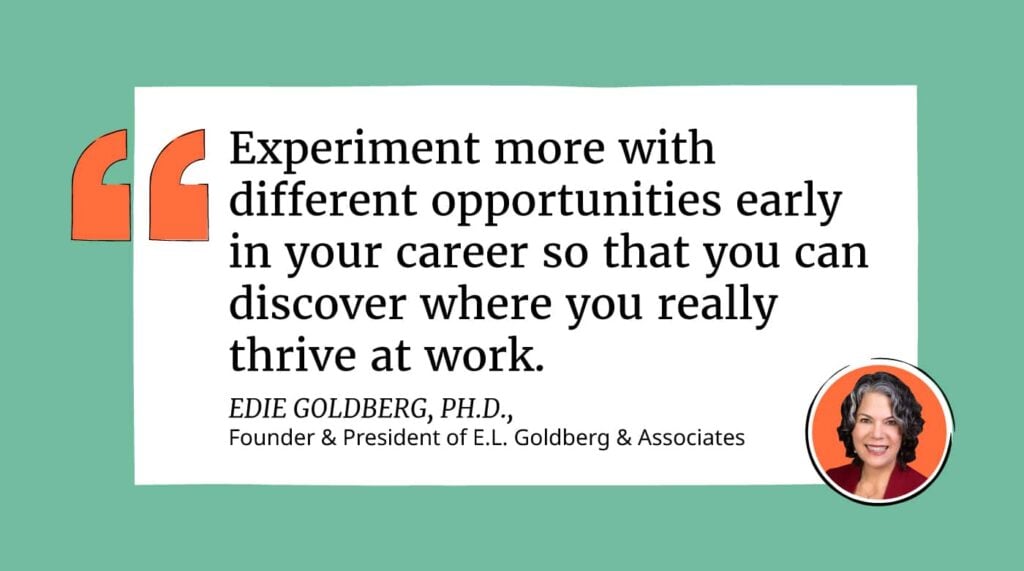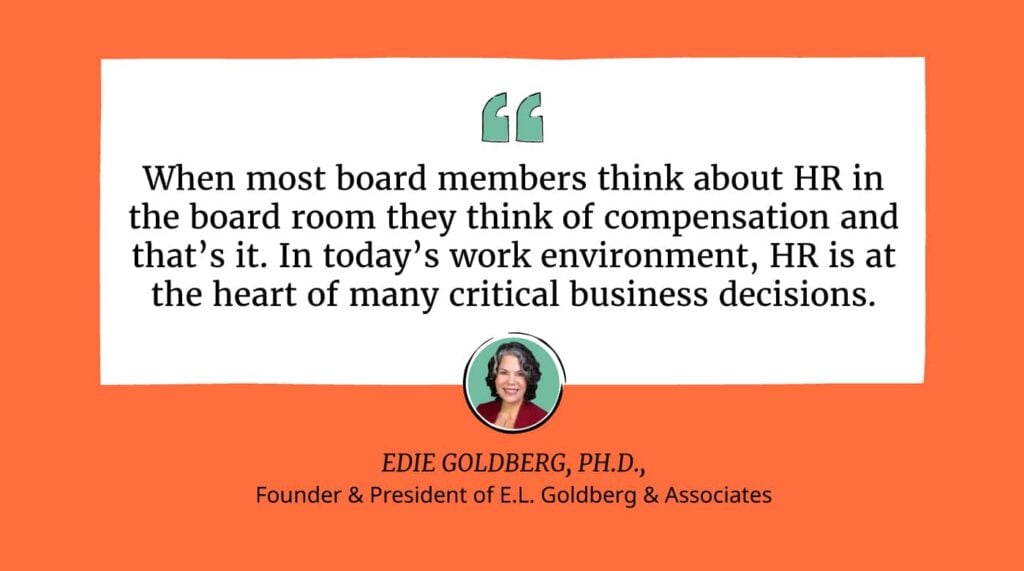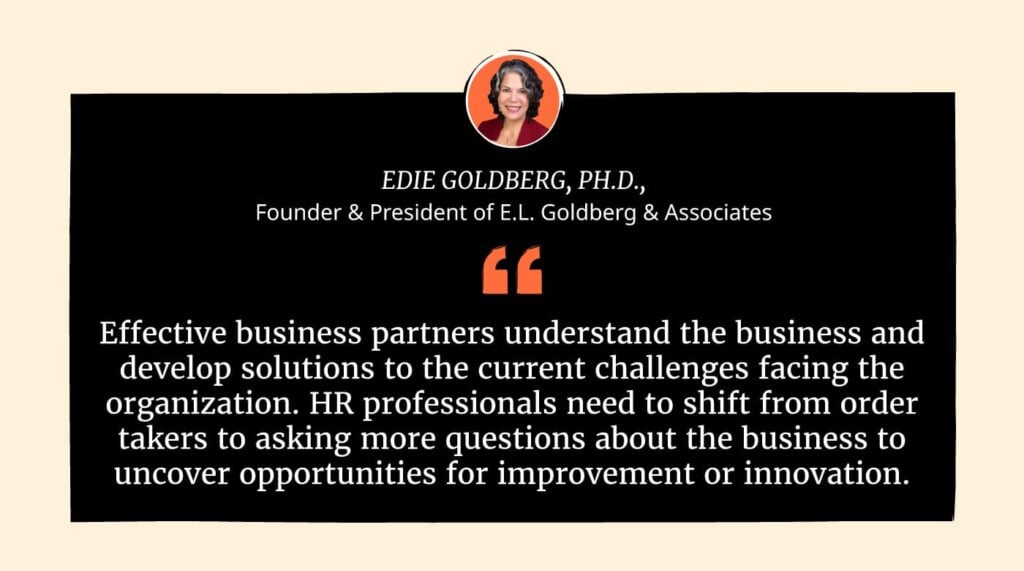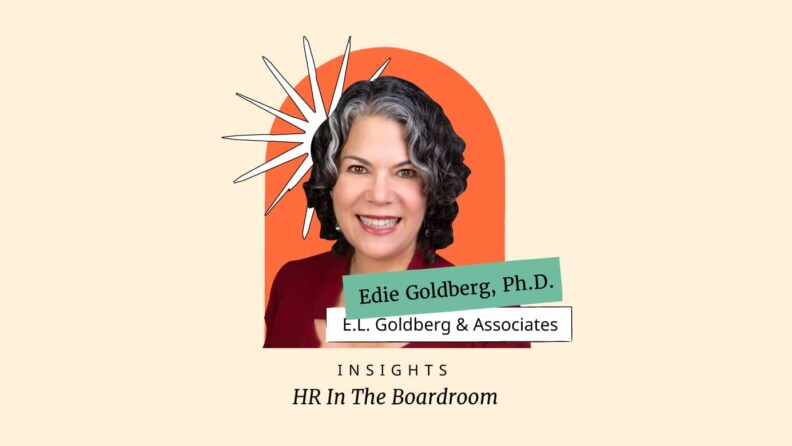Most leaders don’t know how to employ HR as a strategic pillar of the business and this leaves a lot of professionals feeling somewhat frustrated.
In this interview series, we talk to HR professionals, business leaders, and anyone who is an authority on HR who can share what companies can gain by having HR in the boardroom and why and how HR should help drive company decisions.
Welcome, Edie! Before we drive in, our readers would love to “get to know you” a bit better. Can you tell us a bit about your ‘backstory’ and how you got started?
While in graduate school I worked for the Navy Personnel Research & Development Center. The title tells you how long ago that was!
Here I had the opportunity to study the role of culture in the acceptance of workplace innovations, as well as implementing a Total Quality Management practice for the Navy. After getting my Ph.D. in Industrial & Organizational Psychology, I worked for a boutique firm that specialized in assessment and development.
Next, I went to Towers Perrin to become a Global Thought Leader in their Human Capital practice. I started my own consulting firm over 20 years ago.
It’s said that our mistakes can be our greatest teachers. Can you share a story about the funniest mistake you made when you were first starting? Can you tell us what lesson you learned from that?
The first consulting firm I worked for had a pretty conservative and formal CEO. I had been assigned to work on a project at Gap, Inc. and I showed up in a suit. Once the doors closed to the elevator we were in, my escort told me, “Don’t ever show up in this building dressed like that again!.”
I learned you need to do research on your customers and know their culture. Dressing one notch nicer is good, but your credibility is shot if you don’t understand your customer’s brand.
None of us are able to achieve success without some help along the way. Is there a particular person who you are grateful for who helped get you to where you are? Can you share a story?
I am most grateful for my husband who encouraged me to start my own business, helped me understand how to set up my own company, and continuously pushes me to be the best version of myself personally and professionally.
I had thought of starting my own business many times, but I was too afraid that I did not have what it takes to be successful on my own.
I do not like to sell anyone anything, and selling is important when you’re a consultant, but I’m a deep expert in my field and really passionate about the work that I do.
My husband helped me see that I don’t have to “sell,” I just have to solve problems. Everything fell into place from there.

Can you please give us your favorite “Life Lesson Quote”? Can you share how that was relevant to you in your life?
“The more I learn, the more I realize how much I don’t know.” Albert Einstein.
This quote has led to my personal mantra “Always be learning.”
Being curious and learning new things expands your knowledge base and helps you approach problems in new and different ways.
When we are curious, we discover new pieces of information that were not obvious. In my work, companies often approach me with a request to help them with something specific (e.g., Succession Planning).
Rather than taking this at face value, I will ask why and seek to understand the organization’s current challenges so that I can make sure the proposed solution will really achieve the desired outcome.
Thinking back on your own career, what would you tell your younger self?
Experiment more with different opportunities early in your career so that you can discover where you really thrive at work.

Let’s now move to the central part of our interview about HR. Why do you think HR deserves a place in the boardroom and in high-level decision-making? Can you help articulate how a company will gain from that?
69% of companies today can not find employees with the skills they need to execute on their business strategy. There are currently 2 open positions for every unemployed person (5/1 for Software Developers).
Making the right strategic choices that will increase your likelihood of being able to execute on the business strategy puts HR right in the center of decision-making.
Where to put your next call center or design center (cost and availability of talent are critical factors)? How to build a high-performance culture? Yes, HR sits front and center on that too.
How to create a hybrid-working system that increases productivity, reduces turnover, and facilitates collaboration—you need HR for that too.
When most board members think about HR in the board room they think of compensation and that's it. In today's work environment, HR is at the heart of many critical business decisions. Furthermore, recently the SEC has instituted a new requirement to report on Human Capital
Metrics that drive the value of the company. Developing a strategy for what to report, and how to report it, to demonstrate your value on Wall Street without giving away your competitive advantages is a strategic challenge designed for board members with HR expertise to expertly guide.
From your experience, how can HR people and culture professionals ensure they’re involved in strategic planning processes?
It is up to the C-Suite leaders to ensure that HR has a voice at the strategic planning table. As mentioned above, how or where a company expands requires a talent strategy to support that decision.
Making those decisions without relevant data that could influence a successful outcome will be a costly mistake. Furthermore, strategic workforce planning is deeply connected to strategic planning for the organization. They work hand in hand. If HR is not involved in an early enough stage, then opportunities and deadlines will be missed.

A lot of folks believe that CHROs would make great CEOs, but often they’re overlooked. Why do you think that is?
This is complicated but mostly lies in the fact that many still perceive HR to be an administrative function focused on compliance, not organizational strategy.
However, there are many business-savvy CHROs out there who’d make a great CEO. They understand the company culture and are often clear communicators with strong interpersonal skills that make them superior leaders.
For example, Lina Nair, CEO of Chanel, was the former CHRO of Unilever. Mary Barra, the CEO of General Motors, was the former Vice President of HR.
Most HR leaders are not given the same opportunities during succession planning that the CFO or COO may be given earlier in their career.
Providing them with the opportunities to really understand the business, and develop the credibility to lead the organization through special projects, is one way CHROs could gain the experiences that would make them more likely to be selected for a CEO position.
What skills can HR folks work on to become more effective business partners?
Effective business partners understand the business and develop solutions to the current challenges facing the organization. HR professionals need to shift from order takers to asking more questions about the business to uncover opportunities for improvement or innovation.
Here is the primary question of our discussion. Based on your experience and success, what are the five most important ways that HR can help drive company decisions? Please share a story or an example for each.
1. Provide talent data to report on the health of the organization (and to comply with SEC requirements)
While the SEC has made a Human Capital Disclosure requirement, they were very vague as to what this should include. Providing talent metrics is one way to show both the board and your shareholders/stakeholders how healthy the organization is operating.
Intelligence on issues such as turnover, time to fill a position, % of employees actively involved in development, workplace culture, employee well-being efforts, DEI practices, and metrics can all speak to the overall health of the organization.
2. Drive the compensation strategy to achieve the company’s goals.
Compensation is the largest expense for almost every organization. Having a strategy that allows you to attract the right talent, without overpaying, is critical.
Understanding your total compensation strategy can help an organization make wise decisions.
For example, many organizations have moved to an unlimited Personal Time Off (PTO) strategy to attract talent, knowing that the company culture is one that values personal time to relax and refresh, but employees feel a deep responsibility to their co-workers and will not abuse this type of policy.
Companies can reduce the administrative load of tracking time off and carrying time-off accrual on their books.
3. Provide labor market and compensation data to determine the best locations for offices/factories/call centers or for global expansion.
When companies are seeking to expand their organizational footprint to a new area, the cost of property and building is a concern but not as much as the cost of talent.
Moving to a location where the talent does not exist to meet your organization’s needs is a flawed decision that will result in an excessive amount of moving expenses. A talent strategy needs to be in place to meet the business needs.
4. Assess the culture and talent to develop strategies for M&A that put the combined organization in the best possible position.
Most mergers and acquisitions (M&A) fail due to a conflict in the cultures of the two companies and the inability to capitalize on economies of scale. The best M&A outcomes are the result of deep due diligence about the company, its culture, and its talent to understand how the new combined entity can be better than the two companies simply combined.
A few years ago, I was brought in to help two merging companies create a high-performance culture that was not present in either of the previously independent companies.
We assessed the culture of each organization, understood their individual capabilities, and then were able to strategically facilitate a new culture that combined the best of both companies to be better in their newly combined entity.
5. Create new talent strategies that increase the company’s competitive position e.g., able to attract the best talent, optimize the workforce to increase productivity, and improve organizational agility.
During the recent COVID-pandemic, companies that were able to respond to the changing business conditions as an opportunity to improve their competitive position clearly excelled during challenging times.
Creating an agile talent strategy that enables companies to shift their talent to meet the company's most pressing business challenges emerged as a critical capability.
For example, When Verizon’s retail stores closed, they took that opportunity to upskill store-based employees into new roles, where they had greater demand, and made them more fit for the future.
Can you share 3 or 4 of the most common mistakes you have seen businesses make when faced with hard decisions? What should one keep in mind to avoid that?
The most common mistake I have seen is jumping to a quick conclusion as to what the problem is, rather than doing the due diligence to ensure you are fixing the right problem.
Getting curious and asking many questions with different people across the company often can reveal the root cause issue that needs to be addressed.
The second most common mistake is relying on old-school methods (e.g., last in, first out), rather than strategically thinking about the talent you currently have available to you and what capabilities you need for the future.
Related to this mistake is exiting employees from the organization because they are in a job you are eliminating, and not assessing the capabilities the employees’ have to see if they could be better deployed elsewhere in the organization.
This results in a tremendous amount of outplacement costs and an increase in salaries paid to external hires. When you understand the skills and capabilities of individuals you can make better talent decisions.
When trying to create a high-performance organization, most companies focus more on results than on behaviors. When people get results “at all costs,” they create a toxic culture that becomes ineffective. One of the best ways to demonstrate new company values in how employees are expected to work together to get better outcomes is to terminate high-performing executives who behave badly.
This clearly sends the message to everyone else that getting results the wrong way will not be tolerated in the organization.
Is there a person in the world whom you would love to have a private lunch with, and why?
Ram Charan – He is a global business advisor who has so much wisdom that every time I hear him speak; I learn something new.
Ram also understands the value that HR provides in the boardroom, and I would always love to hear him chime in on this topic of how to get more CEOs and more boards of directors to understand the critical role that HR can have in both developing business strategy and managing the risks related to the execution of that strategy.
Thanks Edie! Some great insights in there! How can our readers further follow your work?
I am pretty easy to Google and people can learn more about my work on my website.
Other insights from the series:



